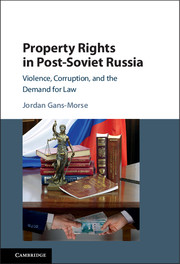Book contents
- Frontmatter
- Contents
- List of Tables
- List of Figures
- Acknowledgments
- 1 Violence, Corruption, and Demand for Law
- 2 Institutional Supply and Demand
- 3 The Evolution of FirmStrategies
- 4 The Role of State Legal Capacity
- 5 Demand-Side Barriers to the Use of Legal Strategies
- 6 The Effectiveness of Illegal Strategies
- 7 Variation in Strategies across Firms
- 8 Firms, States, and the Rule of Law in Comparative Perspective
- Appendices
- A Original Interview Data
- B Original Survey Data
- C Other Surveys Cited or Analyzed
- D Formalizing the Argument
- E Descriptive Statistics for Key Variables
- F Correlations and Cluster Analysis
- G Selected Regression Tables
- References
- Index
G - Selected Regression Tables
from Appendices
Published online by Cambridge University Press: 13 July 2017
- Frontmatter
- Contents
- List of Tables
- List of Figures
- Acknowledgments
- 1 Violence, Corruption, and Demand for Law
- 2 Institutional Supply and Demand
- 3 The Evolution of FirmStrategies
- 4 The Role of State Legal Capacity
- 5 Demand-Side Barriers to the Use of Legal Strategies
- 6 The Effectiveness of Illegal Strategies
- 7 Variation in Strategies across Firms
- 8 Firms, States, and the Rule of Law in Comparative Perspective
- Appendices
- A Original Interview Data
- B Original Survey Data
- C Other Surveys Cited or Analyzed
- D Formalizing the Argument
- E Descriptive Statistics for Key Variables
- F Correlations and Cluster Analysis
- G Selected Regression Tables
- References
- Index
Summary
Missing data were multiply imputed for all regression analyses shown in Chapters 4 through 6 using the AMELIA II package for R (Honaker et al., 2011). As King et al. (2001) have shown, when data are not missing completely at random, listwise deletion – removing all observations for which data are missing on one or more variables from analyses – is always inefficient and often can lead to biased inference. With the exception of rare circumstances, multiple imputation therefore is preferable to listwise deletion.
Multiple imputation leverages data from other observations in the dataset to impute values for missing data. To capture the uncertainty regarding how well the imputed data represent the true values of missing data, it utilizes multiple imputed datasets. In the current case, 50 sets of imputations were conducted. The imputation model used all variables included in the analyses presented in Chapters 5 through 7 as well as additional variables from the survey data. A complete list of variables used in the imputation model can be found in the replication materials. Regression coefficients displayed in the figures in Chapters 5 through 7 and in the tables below are the mean of these analyses on each of the 50 imputed datasets, while standard errors capture sample variance within each imputed dataset as well as variance across datasets.
In the supplementary analyses in the Online Appendix, I show that listwise deletion produces very similar results for bivariate regressions and regressions with the complete set of control variables. The results are less robust for the saturated model specifications, which is to be expected, given that listwise deletion in many cases removes more than half of the sample for these specifications.
The following tables present selected regression results for model specifications with control variables and for saturated models. Full regression results for each figure – including the bivariate models, the models with control variables, and the saturated models – can be found in the Online Appendix.
- Type
- Chapter
- Information
- Property Rights in Post-Soviet RussiaViolence, Corruption, and the Demand for Law, pp. 231 - 274Publisher: Cambridge University PressPrint publication year: 2017



